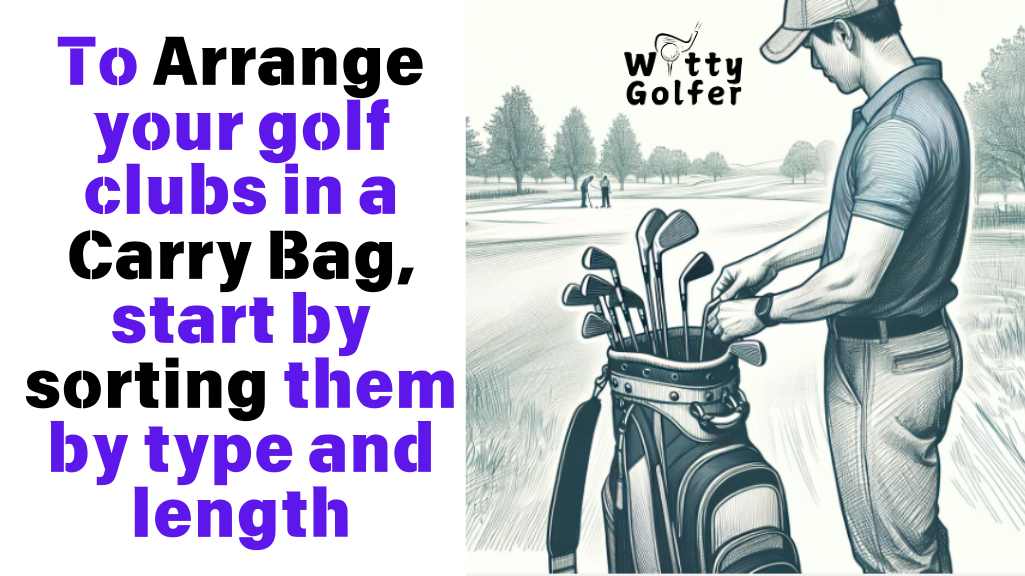To arrange your golf clubs in a carry bag, start by sorting them by type and length.
Place the longest clubs, such as the driver and fairway woods, in the top section of the bag for easy access. The irons should go in the middle section, organized by number, with longer irons on one side and shorter irons on the other. Finally, place your wedges and putter in the bottom section, where shorter clubs are stored. This arrangement keeps your clubs well-organized and makes them easily accessible while maintaining a balanced bag.
| Bag Section | Clubs to Place | Advantages | Percentage of Golfers Who Use This Arrangement |
|---|---|---|---|
| Top Section | Driver, Fairway Woods, Hybrids | Easy access for long-distance shots; prevents damage to other clubs | 80% |
| Middle Section | Irons (3-iron to 9-iron) | Organized by loft for quick selection; keeps clubs from clattering | 75% |
| Bottom Section | Wedges (Pitching, Sand, Lob), Putter | Shorter clubs placed where they are easy to grab for short shots | 70% |
Why Proper Club Arrangement Matters

Properly arranging your golf clubs in a carry bag has several benefits:
- Efficiency on the Course: A well-organized bag allows you to grab the right club quickly without unnecessary searching.
- Protection for Your Clubs: Prevents clubs from knocking against each other, which can cause damage to the shafts and clubheads.
- Improved Balance: Even weight distribution ensures that the bag is comfortable to carry over long distances.
- Professional Appearance: An organized bag looks neat and conveys professionalism, which is valued in the golfing community.
Understanding Your Carry Bag
Before organizing your clubs, it’s important to understand the layout of your carry bag. Most carry bags come with compartments or dividers to help you separate your clubs. Here are the main components to note:
- Club Dividers: Typically, carry bags have 2 to 6 dividers, which separate your clubs into sections.
- Pockets: For storing additional items like balls, tees, gloves, and personal items.
- Straps: Designed for comfortable carrying, often adjustable for weight distribution.
- Orientation: The bag is carried at an angle, so how you place your clubs impacts accessibility.
5 Step-by-Step Guide to Arranging Your Clubs

1. Sort Your Clubs by Type and Length
Begin by organizing your clubs outside of the bag. Separate them into the following categories:
- Woods and Drivers: These are the longest clubs, used for long-distance shots.
- Irons and Hybrids: Versatile clubs for various ranges and situations.
- Wedges: Specialized for short approach shots and sand play.
- Putter: Used for precision on the green.
Sorting them first helps you visualize how to distribute them within your bag.
2. Place Woods and Drivers in the Top Section
The top section of your carry bag is the closest to the strap or handle. This area is best suited for the longest clubs, such as:
- Driver
- Fairway woods
- Hybrids (if applicable)
Why?
Placing these clubs at the top makes them easily accessible, especially when the bag is standing upright or being carried at an angle. Their longer shafts also fit well in this section, ensuring they are protected and don’t interfere with shorter clubs.
3. Organize Irons in the Middle Section
Irons typically make up the bulk of your golf set and are shorter than woods but longer than wedges. Arrange them in ascending or descending order of loft (e.g., 3-iron through 9-iron) for quick selection.
Tip for Organization:
- Place lower-numbered irons (longer irons) toward the left or center.
- Higher-numbered irons (shorter irons) can go to the right or farther down.
This system keeps the bag balanced and helps you grab the right iron without confusion.
4. Store Wedges in the Bottom Section
Wedges, such as the pitching wedge, sand wedge, and lob wedge, should go in the bottom section of your bag. These are shorter clubs and are often used closer to the hole, so having them readily accessible makes sense.
Benefits of Bottom Placement:
- Prevents crowding in the middle section.
- Keeps the shorter clubs from knocking against the longer ones.
5. Place the Putter in a Designated Slot
Many carry bags have a specific compartment or holder for the putter. If your bag doesn’t have one, you can place the putter in the bottom section alongside the wedges. The putter is often the most frequently used club, so keeping it separate can make it easier to access.
Here’s a simplified table summarizing where to place each type of club in a standard carry bag:
| Bag Section | Clubs to Place | Reason |
|---|---|---|
| Top Section | Driver, Fairway Woods, Hybrids | Long clubs; easier to access when standing or carrying. |
| Middle Section | Irons (3-iron to 9-iron) | Bulk of the set; organized by loft for quick selection. |
| Bottom Section | Wedges (Pitching, Sand, Lob), Putter | Short clubs; frequent use near the green. |
Additional Tips for Club Arrangement
1. Use the Dividers Wisely
If your bag has multiple dividers, assign each slot a specific club or type of club. For example, keep woods in one section, irons in another, and wedges in a third. This avoids overcrowding and ensures every club has its place.
2. Balance the Weight
Distribute the weight evenly across the bag. This is particularly important for carry bags since an imbalanced load can cause discomfort over time. If the left side feels heavier, adjust by redistributing clubs.
3. Protect Your Clubs
Use headcovers for woods and drivers to prevent scratches and dents. While irons and wedges are less prone to damage, separating them with dividers can minimize clattering.
4. Store Non-Club Items Strategically
Leave enough room for other essentials like golf balls, tees, gloves, and a towel. Use side pockets or compartments to keep these items organized. Avoid overloading the bag, as it adds unnecessary weight.
5. Reevaluate Periodically
As you play more rounds, reassess the arrangement to ensure it works for your playing style. Some golfers prefer slight tweaks, such as grouping frequently used clubs closer together.
4 Common Mistakes to Avoid
1. Overcrowding One Section
Packing too many clubs into one section can make them hard to remove and increase the risk of damage. Spread the clubs evenly.
2. Ignoring Weight Distribution
If the bag feels lopsided, it’s likely because clubs are unevenly placed. Rearrange the clubs to balance the weight.
3. Forgetting to Secure Clubs
Ensure that clubs are placed firmly in their slots. Loose clubs can shift during movement, causing noise and potential damage.
4. Neglecting Headcovers
Skipping headcovers on woods and drivers can lead to chips and scratches over time, reducing their lifespan and performance.
Why Is Club Organization Important?
Proper club arrangement helps balance your carry bag, making it more comfortable to carry during an afternoon of golf. It also protects equipment like graphite shafts, club heads, and expensive aftermarket shafts from unnecessary damage. Additionally, organized golf equipment allows you to quickly grab the right club without fumbling through a cluttered bag. This system is beneficial for beginner golfers, amateur golfers, and even professional golfers.
What Are the Different Types of Golf Bags, and How Do They Affect Club Organization?
There are various types of golf bags, such as classic 4-way top bags, eight-way divider golf bags, and 5-way Tour Bags. Some bags come with individual slots or full-length dividers for better club protection. Cart bags and hybrid bags are ideal for those who use a golf cart or push cart, as they provide extra storage space and separate compartments for essential accessories like golf balls, divot tools, and personal items. Knowing the type of golf bag you have will help you optimize your club arrangement.
How Should I Use Dividers in My Golf Bag?
Dividers in your bag, whether they are individual dividers or an eight-way divider system, help keep your clubs organized and prevent them from clattering against each other. For example, place your driver and Callaway woods in the back divider, irons middle (3-6 iron on the right side divider), and shorter clubs like 4 wedges (including lob wedges) in the accessible slots at the bottom.
What Accessories Should I Carry in My Bag, and Where Should I Store Them?
A well-organized golf bag includes essential accessories and extra items stored in dedicated compartments:
- Valuables Pocket: Store personal items like a phone, wallet, or keys.
- Apparel Pockets: Keep a rain jacket, light jacket, or extra clothing in these pockets.
- Beverage Pocket: Use this for a water bottle or bottle of sunscreen.
- Ball Pocket: Store boxed golf balls or 10-12 golf balls for easy access.
- Cooler Pocket: Use for drinks or snacks.
- Dedicated Putter Slot: Ideal for oversized putters or clubs with aftermarket shafts.
Can I Optimize My Bag for Balance?
Yes, distributing the brunt of iron weight and other clubs properly ensures better balance. For example:
- Place heavier clubs, like woods, in the topmost or back compartments.
- Mid-irons and high-numbered irons (4-9 irons) go in the middle slot.
- Shortest clubs like wedges and putters are placed in the bottom or accessible slots.
How Do I Arrange Clubs in a Bag with Extra Storage Space?
If your bag has ample storage space, like a cart bag or hybrid bag, arrange your clubs by type of club and use the additional pockets for organization. Store items like an extra golf glove, box of golf balls, and divot repair tools in separate compartments to keep everything accessible.
Does Club Arrangement Differ Based on the Type of Golfer?
For amateur golfers or beginner golfers, a simple setup like organizing by club length and type works well. Avid golfers or professional golfers may prefer a more detailed club arrangement, such as grouping utility irons or aftermarket driver shafts separately for strategic gameplay.
Example Club Arrangement for a 4-Way Divider Golf Bag:
| Bag Section | Clubs to Place |
|---|---|
| Top Section | Driver, fairway woods, hybrid clubs |
| Middle Left Section | 3-6 irons |
| Middle Right Section | 7-9 irons, pitching wedge |
| Bottom Section | 2-3 wedges, putter separate |
This setup ensures proper organization, making your clubs accessible while protecting equipment from damage.
How Can Feng Shui Principles Be Applied to Golf Bag Organization?
Using Feng Shui principles, aim for balance and ease of access. Group similar items like shorter clubs, such as wedges, together and ensure accessible pockets for emergency items like a waterproof jacket. Keep your bag clean and organized, reflecting harmony and preparedness for any round of golf.
By maintaining proper club arrangement and utilizing your bag’s storage features, you can ensure an efficient, enjoyable golfing experience, whether you’re a 20-handicap or a scratch golfer.
Final Words
Arranging golf clubs in a carry bag is a simple but vital aspect of being prepared on the course. By understanding your bag’s layout, sorting your clubs by type, and organizing them based on length and frequency of use, you can streamline your game and protect your equipment. Remember to balance the weight, protect your clubs, and periodically reassess your setup to ensure optimal performance. A well-organized golf bag not only makes the game more enjoyable but also helps you maintain a professional appearance on the course.